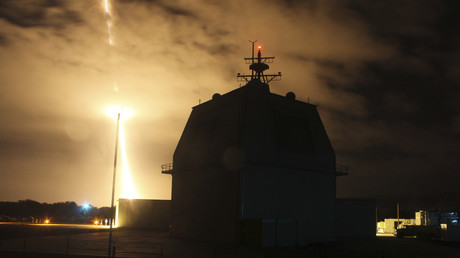Skydio R1 review: a mesmerizing, super-expensive self-flying drone
The idea of a robot methodically hunting you down isn’t the most pleasant of concepts. A metal-bodied being zooming after you at up to 25 miles per hour with multiple eyes fixed on your location seems… out of your best interest.
The Skydio R1 drone seems friendly enough. though. I wouldn’t call it loving or cute by any means, but it really just wants to keep up with you and ensure it captures your great life moments with its big blue eye.
What makes the $2,499 Skydio R1 special is that it doesn’t need a pilot — it flies itself. The drone uses 12 of its 13 on-board cameras to rapidly map the environment around it, sensing obstacles and people as it quickly plans and readjusts its flight paths. That means you can launch the thing and go for a walk. You can launch the thing and explore nature. You can launch the thing and go biking and the R1 will follow you with ease, never losing sight of you as it tries to keep up with you and capture the perfect shots in 4K.
That was the company’s sell anyway; I got my hand on one a few weeks ago to test it myself and have been zipping it around the greater West coast annoying and impressing many with what I’ve come to the conclusion is clearly the smartest drone on the planet.
The R1 has a number of autonomous modes to track users as it zips around. Not only can the drone follow you, it also can predict your path and wander in front of you. It can orbit around you as you move or follow along from the side. You can do all this by just tapping a mode, launching the drone and moving along. There are options for manual controls if you desire, but the R1 eschews the bulky drone controller for a simple, single-handed control system on the Skydio app on your phone.
The app is incredibly simple and offers a wide range of tracking modes that are pretty breezy to swipe through. Setting the drone up for the first flight was as simple as connecting to the drone via password and gliding through a couple of minutes of instructional content in the app. You can launch it off the ground or from your hand; I opted for the hand launch most times, which powers up the propellers until it’s tugging away from you, flying out a couple of meters and fixing its eye on you.
Walking around and having it follow you is cool and all, but this thing shines when you’re on the move and it’s speeding to catch up with you. It’s honestly so incredible to fire up the R1 and run through a dense forest with it trailing you; same goes for a bike ride. It speaks to Skydio’s technology how few hiccups it had in the midst of extended sessions, though by extended session I mean around 15 minutes, as that was the average flight time I got from a single battery charge. The Frontier Edition R1 ships with a second battery, which was a godsend.
When it comes to capturing precise, buttery smooth footage, there’s no replacement for a skilled drone pilot. Even with a perfectly good gimbal, the movements of the R1 are often pretty sudden and lead to direction changes that look a bit weird on camera. Not every continuous shot you gather from the R1 will make the cut, but what’s crazy is that you literally don’t have to do anything. It just follows and records you, leaving you a lot of footage that you’ll be able to pare down in editing.
There are some things I don’t love. It’s too big for one; the company insists that it’s still small enough to fit in a backpack, but unless it’s a backpack that you could also load a 17-inch gaming laptop in, I kind of doubt that. The body feels light and substantial; but the rigidity of its outer frame and its overall size made me a little nervous at times that I was going to catastrophically break it, which was enough to make me consciously leave it at home when I was out on a snowboarding trip.
I’m also a little distraught by the company’s decision to make this purely Wi-Fi controlled over your phone connection, a decision that definitely helps you from losing it, but also kind of limits its core utility when it comes to tracking people who are not holding the phone. I sicced the drone on a friend of mine who was running around a neighborhood area but after he took off in a sprint, the R1 lost the signal and it came to a stop over a street where I was left trying to reconnect and move it to safety as cars zoomed by a few feet beneath it.
For $2,499, it’s not ridiculous to desire some features that also make this more of a general-purpose drone, as well; all of the propellers are there, so it doesn’t seem like it should be a coup to offer an add-on controller that extends the range from a few hundred feet as it currently is.
Not a complaint at all, but I am excited to see the functionality gains this gets from future software updates; namely I think it’d be really to fun to track a pet (it currently can only recognize humans). At one point when it was following me around in a park, it majorly freaked out a bunch of dogs, who promptly started chasing it — and by extension, me. The sadist in me kind of wanted to chase them back with the R1.
The R1 is a $2,499 product with a feature that makes it particularly attractive to the first-time drone user who definitely won’t spend that much money in the first place. In some ways this mismatch shows just how disruptive this tech could be, but in the short-term the targeted buyer of this drone is an extremely tight niche.
For the early adopter who just loves getting the new thing, you’ll be pleased that it actually works and isn’t another half-baked dream on the road to autonomy. If you’re a creator or vlogger who does a lot of solo trips in the great outdoors, this drone could definitely transform how you capture your trips and end up being a great buy — albeit a super pricey one.
Read more
April 02, 2018 at 02:19PM
from TechCrunch
via IFTTT





No comments